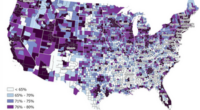Researchers at Wake Forest University School of Medicine have been awarded a $7.5 million grant from the National Institutes of Health (NIH) Helping End Addiction Long-term (HEAL) initiative to establish a data infrastructure support center. The center will aid HEAL Data 2 Action (HD2A) innovation projects at institutions across the United States by developing data-related resources and training related to substance use, pain management, and the reduction of opioid overdoses. The grant will also monitor opioid overdoses in real time to identify trends and gaps in resources in local communities where services are most needed. This funding will help improve and create new prevention strategies for the opioid crisis, which was exacerbated by the COVID-19 pandemic. According to the Centers for Disease Control and Prevention (CDC), nearly 75% of drug overdose deaths in the U.S. in 2020 involved an opioid. The five-year grant from NIH HEAL will help Wake Forest University School of Medicine to establish a data support center that will aid in the fight against opioid use disorder and pain management research.
Wake Forest University School of Medicine Receives $7.5 Million Grant from NIH to Establish Data Support Center for Opioid Use Disorder and Pain Management Research
Researchers at Wake Forest University School of Medicine have been awarded a $7.5 million grant from the National Institutes of Health (NIH) Helping End Addiction Long-term (HEAL) initiative. The grant will fund the establishment of a data infrastructure support center to assist HEAL Data 2 Action (HD2A) innovation projects at institutions across the United States.
The HD2A program is designed to utilize real-time data to reduce overdoses and improve opioid use disorder treatment and pain management. The program’s innovation projects aim to address gaps in prevention, harm reduction, treatment of opioid use disorder, and recovery support.
Wake Forest University School of Medicine’s center will support these innovation projects by removing barriers that hinder the streamlined and rapid distribution of solutions. The center will also develop data-related resources, education, and training related to substance use, pain management, and the reduction of opioid overdoses.
Meredith C.B. Adams, M.D., associate professor of anesthesiology, biomedical informatics, physiology and pharmacology, and public health sciences at Wake Forest University School of Medicine, said that the goal of the center is to collect and analyze data to inform prevention and treatment services. By monitoring opioid overdoses in real time, researchers will be able to identify trends and gaps in resources in local communities where services are most needed.
Adams also noted that the funding will help improve and create new prevention strategies for the opioid crisis, which was exacerbated by the COVID-19 pandemic. According to the Centers for Disease Control and Prevention (CDC), there was a 29% increase in drug overdose deaths in the U.S. in 2020, and nearly 75% of those deaths involved an opioid.
The five-year grant from NIH HEAL will help Wake Forest University School of Medicine to establish a data support center that will aid in the fight against opioid use disorder and pain management research.
EurekAlert! and AAAS do not take responsibility for the accuracy of news releases submitted by contributing institutions or the use of any information obtained through the EurekAlert system.
Don’t miss interesting posts on Famousbio










